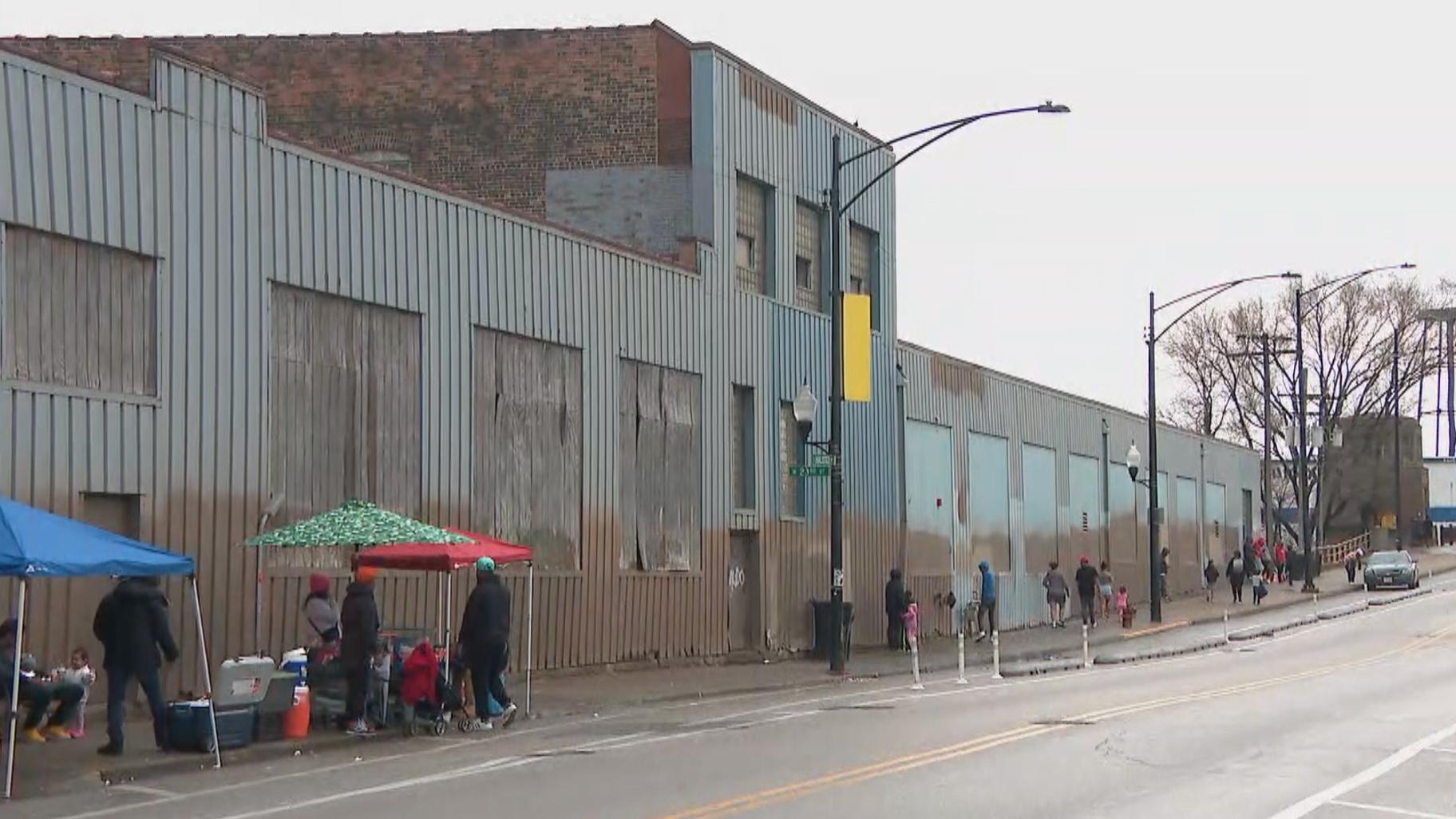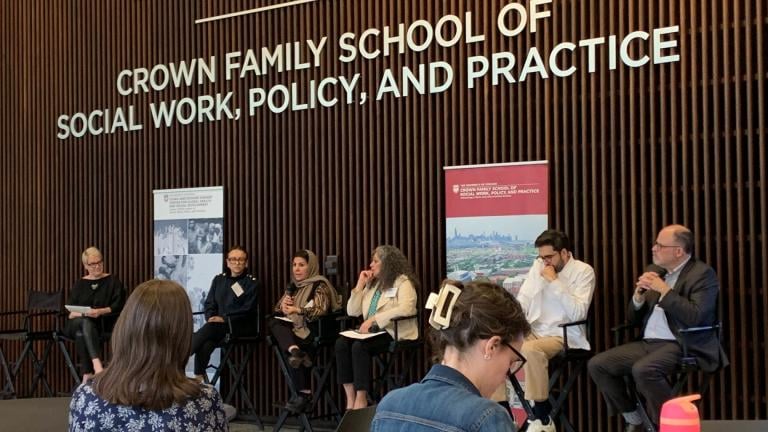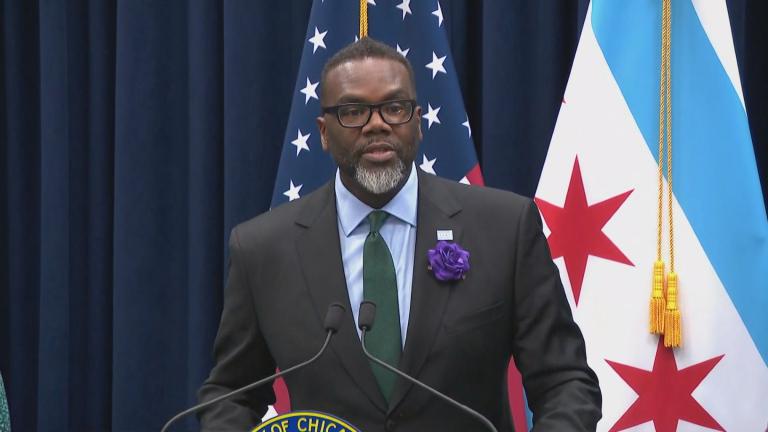 The former industrial building at 2241 S. Halsted St. that has been converted into the city's largest shelter. (WTTW News)
The former industrial building at 2241 S. Halsted St. that has been converted into the city's largest shelter. (WTTW News)
Chicago officials will begin evicting migrants from city shelters on Sunday – but will allow families with school-age children to stay in place until after the academic year ends in June, a major change to the 60-day limit previously imposed by Mayor Brandon Johnson.
In addition, no one will be evicted from the city’s migrant shelter in Pilsen, where 10 cases of measles had been confirmed as of late Thursday night. Everyone asked by health officials to quarantine for at least 21 days in that shelter after being exposed to measles will be allowed to stay for that period and an additional week, said Cristina Pacione-Zayas, Johnson’s first deputy chief of staff.
“This is an unpredictable crisis, and we will pivot when needed,” Pacione-Zayas said.
New rules will require everyone admitted to a city-run shelter to agree to be vaccinated against measles, in the hopes of stopping additional outbreaks of the disease, officials said. No one has refused the vaccine, either while living in a city shelter or after arriving in Chicago, said Chicago Department of Public Health Commissioner Olusimbo “Simbo” Ige.
Johnson was first asked whether he was prepared to evict children from city shelters, likely disrupting their academic year and causing significant stress for already vulnerable people, in late January.
City officials had been working for weeks on the plan to exempt families with children younger than 18 from the limits on shelter stays but could not announce it until Friday, approximately 24 hours before some families had been told they would have to leave, Pacione-Zayas said. The scramble to respond to the measles outbreak delayed that work, she added.
“We would have liked to have gotten this information to people earlier,” Pacione-Zayas said, adding that her staff have been working 16-hour days for several weeks. “But there is no blueprint for this. We are building the plane as we are flying it.”
Families with children younger than 18 are now eligible for three 30-day extensions, which would expire on June 10, officials said. The last day of school before summer break for Chicago Public Schools is June 6. That exemption will cover 4,500 people who had been told they would have to leave city shelters in March, April and May, officials said.
Thirty-five people now living in three city shelters will be informed Friday they will have to leave by 2 p.m. Sunday, said Brandie Knazze, the commissioner of the Department of Family and Support Services. That will give them a reprieve of about 24 hours to comply with a new policy requiring city officials to give migrants 48 hours’ notice they have to leave city facilities, she added.
Migrants evicted from a city shelter with nowhere else to go can return to the designated “landing zone” for buses from Texas at Polk and Desplaines streets in the West Loop, and reapply for shelter, according to the policy. If space is available, they could return for an additional 60 days, officials said.
An additional 244 people will be required to leave city shelters by March 31, with another 1,782 set to be evicted by April 30, officials said.
That means 2,026 migrants are set to be evicted by April 30, officials said. That is significantly less than 5,600 migrants who are set to exhaust limits first imposed by Mayor Brandon Johnson in November — but then extended three times in January and February.
More than 4,100 migrants who are eligible for rental assistance through a state program will be allowed to stay in city shelters as long as they are working toward finding a more permanent home. Those who entered a city shelter after Nov. 17 are not eligible for that assistance. They will only be allowed to stay in shelters if they have signed a lease for an apartment and are waiting to move in or are waiting for help to leave Chicago, officials said.
Exemptions are also available to those who are ill or have been the victim of gender-based violence, are pregnant or are caring for a newborn, suffering from mental illness or suffered a recent bereavement, officials said.
Since the beginning of February, Chicago officials have closed five city-run shelters as the number of migrants arriving in Chicago slowed and the pace of people finding permanent housing increased. More than 11,200 people were living in 23 city facilities as of Friday, a 25% drop since mid-December, the most recent peak of the humanitarian crisis facing Chicago.
It is unclear whether city officials will close shelters as migrants are evicted, which would limit the number of beds available for those who have already been in a city-run shelter for 60 days as well as for new arrivals.
Ald. Andre Vasquez (40th Ward), the chair of the City Council’s Committee on Immigrant and Refugee Rights, sent Johnson a letter signed by 22 members of the City Council and the leaders of 40 community organizations helping to care for the migrants urging the mayor to scrap the limit entirely.
“It is an improvement,” Vasquez said of the changes announced Friday. “It mitigates some of the trauma.”
However, more migrants will arrive in Chicago as the weather warms and during the run-up to the Democratic National Convention, and Chicago should be expanding the number of shelters, not reducing them, Vasquez said.
Johnson told reporters on Wednesday he is “very sympathetic” to concerns voiced by Vasquez, but blamed the federal government for the humanitarian crisis that has defined his first 10 months in office.
“This is a really jacked-up situation,” Johnson said. “My response to my colleagues is: This is an emergency temporary shelter. I don’t know how long this crisis is going to last. So we need the federal government and my colleagues to send in a letter with me to get the federal government to pass a law to check (Texas) Gov. (Greg) Abbott. Because that is the real crisis: An out-of-control tyrant, a petulant one at that.”
More than 37,100 migrants, all of whom are in the country legally after requesting asylum, have made their way to Chicago as part of an effort by Abbott, a Republican, to damage President Joe Biden’s chances for reelection and divide Democratic voters.
Contact Heather Cherone: @HeatherCherone | (773) 569-1863 | [email protected]








